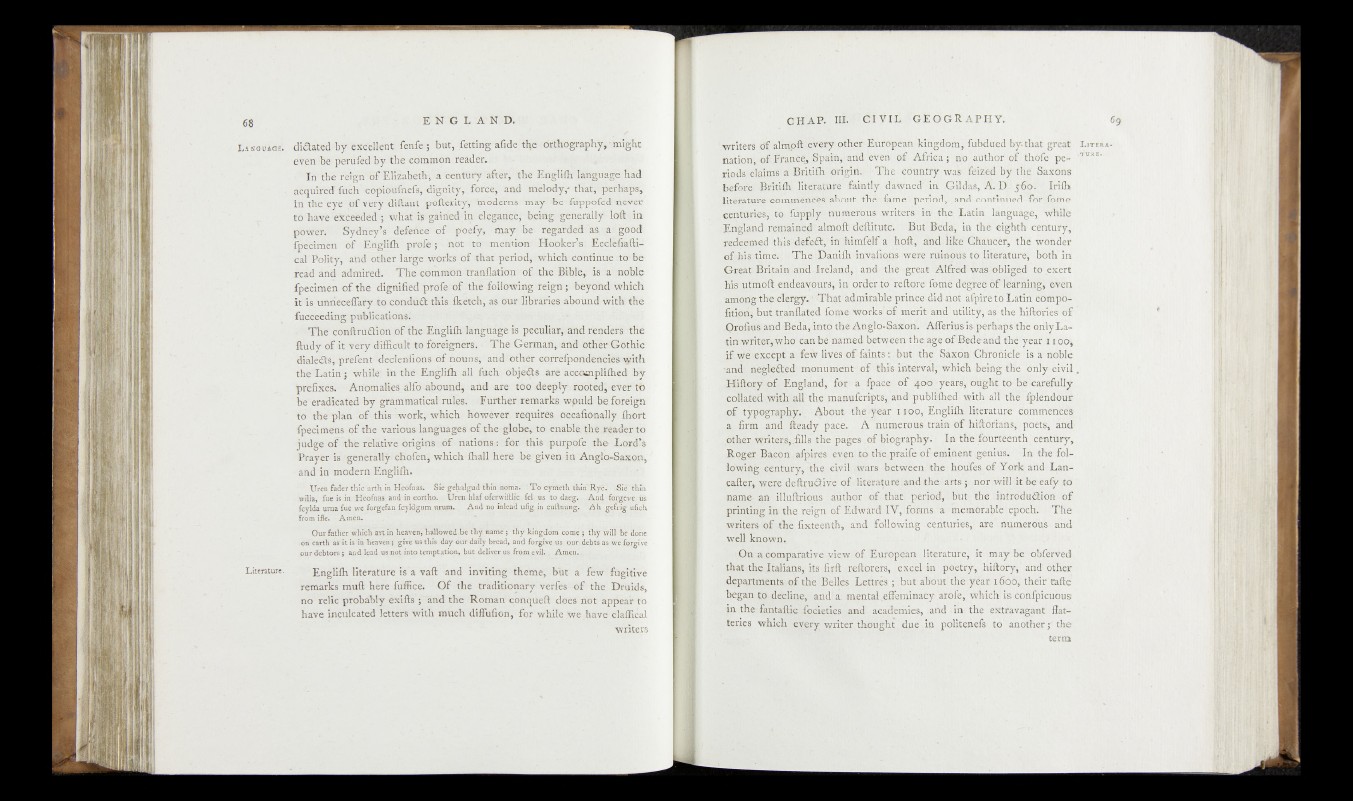
Xià s o 'vAgë.
Literature.
dilated by eXc%Hen05fenfer}^butYJfettmgJa)fi.-de tfte QC&h'Qgrajphy?%ftf»ht
even -bë1 perüfèd by1 ihe comm'Ojn-'reader.,,;!
In the f d i^ ^ ;fe'iz'abèth*/-l^htury'after'fthf Èi^tiim^gdagèta'd
acquired fuch copioufnefs, dignity, force, and melody,- that, perhaps,
in the eye of very diftant poflerity, moderns may bé fuppofed never
to have exceeded; what i> gained in elegance, being generally loft in
power." ' Sydhey’a" defed'ce'^of p'oéfy4' I1 may f c r.egarded'^^^a’fegatod
fpecimen of Englilh profe; not to mention Hooker’s., 'Ecdéfihfft-
cal‘Polity, a'nd other large works y f *thaf .|rêrrod^Mhkft«ü«ftmi'e stéfcÊë
:fe|d and adtóretL Tfté-comftion-.tranflatic*n •a&'oa^rïüble
fpecimen of the dignified p'röfó-of thft foite^ii^^reigh^f'bey^drMVhich
iftis ’unnëceffaffiy:.’tp.cbiïdiiö;-this fketch, as ©nr Irbrariesiaboi^aftwittofhe
fücceèdiing’phhlieaticfnsh'' £
The* cofiftfu&ionI#Whe; Engliffi!ÉË^ua|tfe is pectliaa^aijed TeqdóÈsSÜié
ftudy of at very difficult to 'foreigners. The^Qerm®^and>¥th'lrf(3bfhic
dial’ëfli#; fprefent 'ftfecleiïfions-ef nourj-syand- bth’ër eotfeefpondfctfeifewyith
the Latin'; ‘whEfe- in thé- Englilh all fosh (ftjeétss are accocipli-fhed by
|>reflxêsi.~ ■ Arfothalies tflforahound,' and -af e . toohdeepl^yf©oted ji e4er 'tb
bë eradicated by'grammatical rules. • Further remarks wpuld»Heforeign
to’ the'plan oE this ^work, which however, requiiy'8£,OG.cafió®ally fhbrt
fpecimens of the various languages of the’ gftrhefjto enable. the,jeadfeF to
judge of the relative origins ofo nations: foe this purp®Hs|the- Lord’s
Pmyèr%? generally'dEofen, which Ih^t'herë b è f^ y^jta Ahglo-Saxpa*
and in modem Englilh.
■ -> Urén fader thic arth in Heofnas. Sie gehalgud thin noma. T o eymeth thin- Rye. VSie. tliin
wlila, fue is in Heofnas and in eortho. Uren hlaf oferwiftlic fel us to d a e g.,, A n d forgeve t s
fcylda urna fue we forgefan fcyldgum nrum. An d no inlcad ufig in cultnung. 'A h grfrig uhch
trom 'ifle. * Am en :.
Our father which art in heaven, hallowed be thy. name ; thy kingdom come ; thy will be done
on earth as it is in heaven; give us this day our daily bread, and forgive us ;ouir.debts as we forgive
our d ebtors; and lead us not into temptation, but deliver us from e vil., Amen. „4_
Englilh literatüf& is a vaft and inviting- theifte, biltk a few fugitive
remarks muft here fuffice. Of the traditionary verfes-ef the Druids*,
no relic probably exifts ; and the Roman' 'cëiSrqiieft .dees hot appear to
have inculcated letters with much diffufion, for while ;we have claffical
writers
writers óf almpft every other European kingdom, fubdued by- that great
nation of Fi mçe, Spain, and even of Africa ; no author of thofe pewasr*
fèiàfe^,by thg Saltons
befofeT Britfth- Mtdtatthfl "faiïiitly, cf i\\‘u a Ü ^ ^ ' i© y d | i^ jSb^TJrifhs
literature commencés about the fame period, and continued“ roritbîhe
oÏÉtótne-s,*& |H^rag| humu-m^s .y ri this’*iiÿ làngüâKÔ, wnile
■ Fi^lâpd î onfainlid* ihnoj&ftVlUtutS*'! But Beda, in ÇhtTéïghth- ’
redt 8-mcd ftlafdklèfceï, in hnrïjëliPïy IfSiï,/ fti'cl lila; ölïfïicer, thé wonder
,&âhi£tom;sMi The;!I^ajplly in\^ko_^0\\vfe|e niinogrt tô'lim^ürdf’-both iü
Oiicat.Butain aud lid iiulji.anickitfhe jgmaB^Ificd w.is^obHgodc foexert
liii' utmofl endear oii;P^ïfhij o vtî i r,tóyrcftër e I'm 'o\ en
amorîg'tEe.'cîfefgy'.'i'fDh^t-admif^M^ïiftô'etdiftfflôEafpirëfdLatimchmpb-
fitipiâ,lhdtft^p^^îi^ p fç^rôfks? of merit» aireP»iiti^ty*f®^^iiftciiVcK óf ■
Orofi^a4^BfeqaJ, Intp tHêïM|iglo- Saxon - h^fferihs-isnidr-hap1'tlib órily Larin
writer- who c in bk^nanfedfbètweenwJte4^e oftB'é'de'a'nd 6niëfyeaftî%#©|
i6,wè^exóêpfta)ife|kJiyés;oi'fiint-- :obüt Sâxon ChVon^êfié-jÈ-'n^ble
j8hdy,nqgl0y.ed f^tam^^tÿefôflfe.ib^keïValj'îwhîeh'Jieing ilft, ©uly-oiVll,
J,1 iftotvijof' England, for - a- Jpàëe eS" ^®'^year^^gmfto^b^catdfhll,y
’ collated swith ail th ê J J®ariÿcri|iï%aifd^pli^ffhed with all üi™ipIéntlo®
.of -typo'gj^ky.*, -Aböüy'^hgiyar i ko®,- E'hg-lifli4diteratuoe< ^Irimences-
a firm.sa.nd fteadvJpl^.yu'A^ ^ r hefoàfettaâ.ftjUf ihiftdriaf s, -p'oèts^la i‘d
,jt-^érsw;ritQr4,fil!l|tthe pages *of bïdgcMihy^t tIpftffe;l^^l^n£Îi.‘cen.t.i}ry>
R o g q y B a . c ç n y - a fp i fW lê y e n ^ Q .jE .H ^ p r a i î fè © H t è ô â \ h e ,n t ; fg .e n iu s y 'f tw .th ^ f fp l-
lowiftg jc^mijry^psspjvil ëtyara s b ^ w é e n a h d t l h a n -
caftef, were deftrù^iv;ei (|K;a®3îa|utA|ad(kthMMtô pjnor
name- anâiifuftrious authaf; -îô^i ï^trpe'Mö<%’BÊ\j'tf tf^üuftlóri-^öf
printing in the reign of Edward IV,. forms a memorable epoch. The
writers of the fixteenth, and following icèdfuriós^ aïé 1 if^rriesoftsi- and
well ftnqwn.
- On a comparative view of European literature, it may lîè^qblerved
thatfth|^t,aftan&, its .fij-ftyr^ftprers,., ex.cpLinypnetry, and* ÔtEer
departments of the Belles Lettrés ; but about the year 1600, their tafte
began to decline, and a, mental effeminacy arofe, istMchl is 'CDnfprcubus
initftp ftmtafti-çvj^ic'ieties ,and acatlfeKhics, sand - in> th e , extravagant fiat-
teries which every writer thought due in politenefs to another y the
■ terns